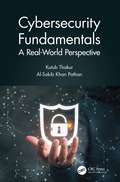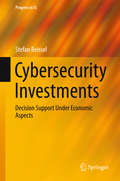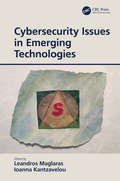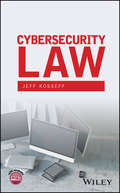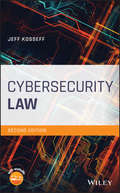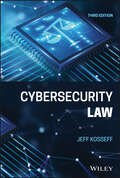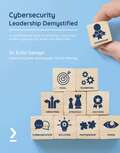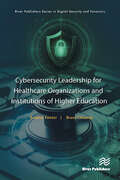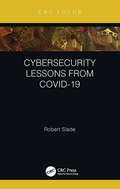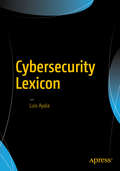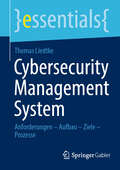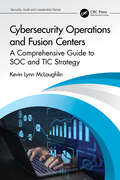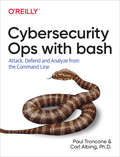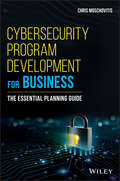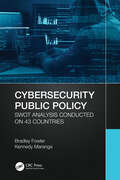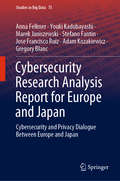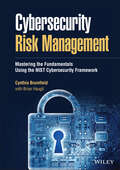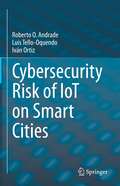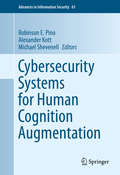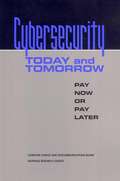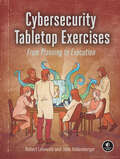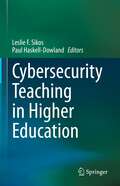- Table View
- List View
Cybersecurity For Dummies
by Joseph SteinbergGet the know-how you need to safeguard your data against cyber attacks Cybercriminals are constantly updating their strategies and techniques in search of new ways to breach data security—shouldn't you learn how to keep yourself and your loved ones safe? Fully updated with information on AI, hybrid work environments, and more, Cybersecurity For Dummies is the best-selling guide you need to learn how to protect your personal and business information from the latest cyber threats. This book helps you build stronger defenses, with detailed instructions on how to protect your computer, your online data, and your mobile devices. Learn how to set up the right security measures and prevent breaches—as well as what to do if your information or systems are compromised. Learn about the different types of cyberattacks and how to defend against them Beef up your data security for hybrid work environments and cloud storage Keep your family members safe against deepfake and other social engineering attacks Make sure you have a plan to respond quickly and limit damage in the event of a breach Ideal for businesses and individuals who want to be cyber-secure. Cybersecurity For Dummies is also a great primer for anyone interested in pursuing a career in cybersecurity.
Cybersecurity Fundamentals: A Real-World Perspective
by Al-Sakib Khan Pathan Kutub ThakurCybersecurity Fundamentals: A Real-World Perspective explains detailed concepts within computer networks and computer security in an easy-to-understand way, making it the perfect introduction to the topic. This book covers fundamental issues using practical examples and real-world applications to give readers a rounded understanding of the subject and how it is applied. The first three chapters provide a deeper perspective on computer networks, cybersecurity, and different types of cyberattacks that hackers choose to unleash on cyber environments. It then goes on to cover the types of major computer malware and cybersecurity attacks that shook the cyber world in the recent years, detailing the attacks and analyzing their impact on the global economy. The details of the malware codes that help the hacker initiate the hacking attacks on networks are fully described. It then covers high-tech cybersecurity programs, devices, and mechanisms that are extensively adopted in modern security systems. Examples of those systems include intrusion detection systems (IDS), intrusion prevention systems (IPS), and security firewalls. It demonstrates how modern technologies can be used to create and manage passwords for secure data. This book also covers aspects of wireless networks and their security mechanisms. The details of the most commonly used Wi-Fi routers are provided with step-by-step procedures to configure and secure them more efficiently. Test questions are included throughout the chapters to ensure comprehension of the material. Along with this book’s step-by-step approach, this will allow undergraduate students of cybersecurity, network security, and related disciplines to gain a quick grasp of the fundamental topics in the area. No prior knowledge is needed to get the full benefit of this book.
Cybersecurity Investments: Decision Support Under Economic Aspects (Progress in IS)
by Stefan BeisselThis book offersreaders essential orientation on cybersecurity safeguards, and first andforemost helps them find the right balance between financial expenditures andrisk mitigation. This is achieved by pursuing a multi-disciplinary approach thatcombines well-founded methods from economics and the computer sciences. Established decision making techniques are embedded into a walk-through for thecomplete lifecycle of cybersecurity investments. Insights into the economic aspectof the costs and benefits of cybersecurity are supplemented by established andinnovative economic indicators. Readers will find practical tools and techniquesto support reasonable decision making in cybersecurity investments. Further,they will be equipped to encourage a common understanding using economicaspects, and to provide cost transparency for the senior management.
Cybersecurity Issues in Emerging Technologies
by Leandros Maglaras and Ioanna KantzavelouThe threat landscape is evolving with tremendous speed. We are facing an extremely fast-growing attack surface with a diversity of attack vectors, a clear asymmetry between attackers and defenders, billions of connected IoT devices, mostly reactive detection and mitigation approaches, and finally big data challenges. The clear asymmetry of attacks and the enormous amount of data are additional arguments to make it necessary to rethink cybersecurity approaches in terms of reducing the attack surface, to make the attack surface dynamic, to automate the detection, risk assessment, and mitigation, and to investigate the prediction and prevention of attacks with the utilization of emerging technologies like blockchain, artificial intelligence and machine learning. This book contains eleven chapters dealing with different Cybersecurity Issues in Emerging Technologies. The issues that are discussed and analyzed include smart connected cars, unmanned ships, 5G/6G connectivity, blockchain, agile incident response, hardware assisted security, ransomware attacks, hybrid threats and cyber skills gap. Both theoretical analysis and experimental evaluation of state-of-the-art techniques are presented and discussed. Prospective readers can be benefitted in understanding the future implications of novel technologies and proposed security solutions and techniques. Graduate and postgraduate students, research scholars, academics, cybersecurity professionals, and business leaders will find this book useful, which is planned to enlighten both beginners and experienced readers.
Cybersecurity Law
by Jeff KosseffA definitive guide to cybersecurity law Expanding on the author’s experience as a cybersecurity lawyer and law professor, Cybersecurity Law is the definitive guide to cybersecurity law, with an in-depth analysis of U.S. and international laws that apply to data security, data breaches, sensitive information safeguarding, law enforcement surveillance, cybercriminal combat, privacy, and many other cybersecurity issues. Written in an accessible manner, the book provides real-world examples and case studies to help readers understand the practical applications of the presented material. The book begins by outlining the legal requirements for data security, which synthesizes the Federal Trade Commission’s cybersecurity cases in order to provide the background of the FTC’s views on data security. The book also examines data security requirements imposed by a growing number of state legislatures and private litigation arising from data breaches. Anti-hacking laws, such as the federal Computer Fraud and Abuse Act, Economic Espionage Act, and the Digital Millennium Copyright Act, and how companies are able to fight cybercriminals while ensuring compliance with the U.S. Constitution and statutes are discussed thoroughly. Featuring an overview of the laws that allow coordination between the public and private sectors as well as the tools that regulators have developed to allow a limited amount of collaboration, this book also: • Addresses current U.S. and international laws, regulations, and court opinions that define the field of cybersecurity including the security of sensitive information, such as financial data and health information • Discusses the cybersecurity requirements of the largest U.S. trading partners in Europe, Asia, and Latin America, and specifically addresses how these requirements are similar to (and differ from) those in the U.S. • Provides a compilation of many of the most important cybersecurity statutes and regulations • Emphasizes the compliance obligations of companies with in-depth analysis of crucial U.S. and international laws that apply to cybersecurity issues • Examines government surveillance laws and privacy laws that affect cybersecurity as well as each of the data breach notification laws in 47 states and the District of Columbia • Includes numerous case studies and examples throughout to aid in classroom use and to help readers better understand the presented material • Supplemented with a companion website that features in-class discussion questions and timely and recent updates on recent legislative developments as well as information on interesting cases on relevant and significant topics Cybersecurity Law is appropriate as a textbook for undergraduate and graduate-level courses in cybersecurity, cybersecurity law, cyber operations, management-oriented information technology (IT), and computer science. This book is also an ideal reference for lawyers, IT professionals, government personnel, business managers, IT management personnel, auditors, and cybersecurity insurance providers. JEFF KOSSEFF is Assistant Professor of Cybersecurity Law at the United States Naval Academy in Annapolis, Maryland. He frequently speaks and writes about cybersecurity and was a journalist covering technology and politics at The Oregonian, a finalist for the Pulitzer Prize, and a recipient of the George Polk Award for national reporting.
Cybersecurity Law
by Jeff KosseffThe second edition of the definitive guide to cybersecurity law, updated to reflect recent legal developments The revised and updated second edition of Cybersecurity Law offers an authoritative guide to the key statutes, regulations, and court rulings that pertain to cybersecurity. Written by an experienced cybersecurity lawyer and law professor, the second edition includes new and expanded information that reflects the latest changes in laws and regulations. The book includes material on recent FTC data security consent decrees and data breach litigation. Topics covered reflect new laws, regulations, and court decisions that address financial sector cybersecurity, the law of war as applied to cyberspace, and recently updated guidance for public companies’ disclosure of cybersecurity risks. This important guide: Provides a new appendix, with 15 edited opinions covering a wide range of cybersecurity-related topics, for students learning via the caselaw method Includes new sections that cover topics such as: compelled access to encrypted devices, New York’s financial services cybersecurity regulations, South Carolina’s insurance sector cybersecurity law, the Internet of Things, bug bounty programs, the vulnerability equities process, international enforcement of computer hacking laws, the California Consumer Privacy Act, and the European Union’s Network and Information Security Directive Contains a new chapter on the critical topic of law of cyberwar Presents a comprehensive guide written by a noted expert on the topic Offers a companion Instructor-only website that features discussion questions for each chapter and suggested exam questions for each chapter Written for students and professionals of cybersecurity, cyber operations, management-oriented information technology (IT), and computer science, Cybersecurity Law, Second Edition is the up-to-date guide that covers the basic principles and the most recent information on cybersecurity laws and regulations. JEFF KOSSEFF is Assistant Professor of Cybersecurity Law at the United States Naval Academy in Annapolis, Maryland. He was a finalist for the Pulitzer Prize, and a recipient of the George Polk Award for national reporting.
Cybersecurity Law
by Jeff KosseffCYBERSECURITY LAW Learn to protect your clients with this definitive guide to cybersecurity law in this fully-updated third edition Cybersecurity is an essential facet of modern society, and as a result, the application of security measures that ensure the confidentiality, integrity, and availability of data is crucial. Cybersecurity can be used to protect assets of all kinds, including data, desktops, servers, buildings, and most importantly, humans. Understanding the ins and outs of the legal rules governing this important field is vital for any lawyer or other professionals looking to protect these interests. The thoroughly revised and updated Cybersecurity Law offers an authoritative guide to the key statutes, regulations, and court rulings that pertain to cybersecurity, reflecting the latest legal developments on the subject. This comprehensive text deals with all aspects of cybersecurity law, from data security and enforcement actions to anti-hacking laws, from surveillance and privacy laws to national and international cybersecurity law. New material in this latest edition includes many expanded sections, such as the addition of more recent FTC data security consent decrees, including Zoom, SkyMed, and InfoTrax. Readers of the third edition of Cybersecurity Law will also find: An all-new chapter focused on laws related to ransomware and the latest attacks that compromise the availability of data and systems New and updated sections on new data security laws in New York and Alabama, President Biden’s cybersecurity executive order, the Supreme Court’s first opinion interpreting the Computer Fraud and Abuse Act, American Bar Association guidance on law firm cybersecurity, Internet of Things cybersecurity laws and guidance, the Cybersecurity Maturity Model Certification, the NIST Privacy Framework, and more New cases that feature the latest findings in the constantly evolving cybersecurity law space An article by the author of this textbook, assessing the major gaps in U.S. cybersecurity law A companion website for instructors that features expanded case studies, discussion questions by chapter, and exam questions by chapter Cybersecurity Law is an ideal textbook for undergraduate and graduate level courses in cybersecurity, cyber operations, management-oriented information technology (IT), and computer science. It is also a useful reference for IT professionals, government personnel, business managers, auditors, cybersecurity insurance agents, and academics in these fields, as well as academic and corporate libraries that support these professions.
Cybersecurity Leadership Demystified: A comprehensive guide to becoming a world-class modern cybersecurity leader and global CISO
by Dr. Erdal Ozkaya Melih AbdulhayogluGain useful insights into cybersecurity leadership in a modern-day organization with the help of use casesKey FeaturesDiscover tips and expert advice from the leading CISO and author of many cybersecurity booksBecome well-versed with a CISO's day-to-day responsibilities and learn how to perform them with easeUnderstand real-world challenges faced by a CISO and find out the best way to solve themBook DescriptionThe chief information security officer (CISO) is responsible for an organization's information and data security. The CISO's role is challenging as it demands a solid technical foundation as well as effective communication skills. This book is for busy cybersecurity leaders and executives looking to gain deep insights into the domains important for becoming a competent cybersecurity leader.The book begins by introducing you to the CISO's role, where you'll learn key definitions, explore the responsibilities involved, and understand how you can become an efficient CISO. You'll then be taken through end-to-end security operations and compliance standards to help you get to grips with the security landscape. In order to be a good leader, you'll need a good team. This book guides you in building your dream team by familiarizing you with HR management, documentation, and stakeholder onboarding. Despite taking all that care, you might still fall prey to cyber attacks; this book will show you how to quickly respond to an incident to help your organization minimize losses, decrease vulnerabilities, and rebuild services and processes. Finally, you'll explore other key CISO skills that'll help you communicate at both senior and operational levels.By the end of this book, you'll have gained a complete understanding of the CISO's role and be ready to advance your career.What you will learnUnderstand the key requirements to become a successful CISOExplore the cybersecurity landscape and get to grips with end-to-end security operationsAssimilate compliance standards, governance, and security frameworksFind out how to hire the right talent and manage hiring procedures and budgetDocument the approaches and processes for HR, compliance, and related domainsFamiliarize yourself with incident response, disaster recovery, and business continuityGet the hang of tasks and skills other than hardcore security operationsWho this book is forThis book is for aspiring as well as existing CISOs. This book will also help cybersecurity leaders and security professionals understand leadership in this domain and motivate them to become leaders. A clear understanding of cybersecurity posture and a few years of experience as a cybersecurity professional will help you to get the most out of this book.
Cybersecurity Leadership for Healthcare Organizations and Institutions of Higher Education (River Publishers Series in Digital Security and Forensics)
by Bradley Fowler Bruce G. ChaundyHealthcare organizations and institutions of higher education have become prime targets of increased cyberattacks. This book explores current cybersecurity trends and effective software applications, AI, and decision-making processes to combat cyberattacks. It emphasizes the importance of compliance, provides downloadable digital forensics software, and examines the psychology of organizational practice for effective cybersecurity leadership.Since the year 2000, research consistently reports devasting results of ransomware and malware attacks impacting healthcare and higher education. These attacks are crippling the ability for these organizations to effectively protect their information systems, information technology, and cloud-based environments. Despite the global dissemination of knowledge, healthcare and higher education organizations continue wrestling to define strategies and methods to secure their information assets, understand methods of assessing qualified practitioners to fill the alarming number of opened positions to help improve how cybersecurity leadership is deployed, as well as improve workplace usage of technology tools without exposing these organizations to more severe and catastrophic cyber incidents.This practical book supports the reader with downloadable digital forensics software, teaches how to utilize this software, as well as correctly securing this software as a key method to improve usage and deployment of these software applications for effective cybersecurity leadership. Furthermore, readers will understand the psychology of industrial organizational practice as it correlates with cybersecurity leadership. This is required to improve management of workplace conflict, which often impedes personnel’s ability to comply with cybersecurity law and policy, domestically and internationally.
Cybersecurity Lessons from CoVID-19
by Robert SladeUsing the SARS-CoV-2/CoVID-19 pandemic as a giant case study, and following the structure of the domains of information security, this book looks at what the crisis teaches us about security. It points out specific security fundamentals where social, medical, or business responses to the crisis failed or needed to make specific use of those concepts. For the most part, these lessons are simply reminders of factors that get neglected during times of non-crisis. The lessons particularly point out the importance of planning and resilience in systems and business. Those studying cybersecurity and its preventive measures and applications, as well as those involved in risk management studies and assessments, will all benefit greatly from the book. Robert Slade has had an extensive and prolific career in management, security, and telecommunications research, analysis, and consultancy. He has served as an educator visiting universities and delivering lecturers and seminars.
Cybersecurity Lexicon
by Luis AyalaThis book offers easy-to-understand definitions of cybersecurity technical terminology and hacker jargon related to automated control systems common to buildings, utilities, and industry, and explains the threats and vulnerabilities of critical infrastructure. Although written primarily for building designers and maintenance personnel, much of the terminology applies to cyber-physical attacks in general. Buildings today are automated because the systems are complicated so we depend on the building controls system (BCS) to operate the equipment. We also depend on a computerized maintenance management system (CMMS) to keep a record of what was repaired and to schedule required maintenance. SCADA, BCS, and CMMS can all be hacked. The Cybersecurity Lexicon puts cyber jargon related to building controls all in one place. The book is a handy desk reference for professionals interested in preventing cyber-physical attacks against their facilities in the real world. Discussion of cybers-physical attacks on automated control systems is clouded by a lack of standard definitions and a general misunderstanding about how bad actors can actually employ cyber technology as a weapon in the real world. The book provides: Concepts related to cyber-physical attacks and building hacks are listed alphabetically with text easily searchable by key phrase. Definitions of technical terms related to equipment controls common to industry, utilities, and buildings--much of the terminology also applies to cybersecurity in general. What you'll learn Readers will be able to quickly find cybersecurity-physical attack concepts and get a simple explanation of the meaning. Many of the most common types of cybersecurity-attacks are explained so readers can quickly assess the threat to their facilities in real time. The definition of as facilities, engineering, and cybersecurity acronyms. Who this book is for Architects, Engineers, Building Managers, Students, Researchers and Consultants interested in cybersecurity-attacks against facilities in the real world. Also for IT professionals getting involved in cybersecurity responsibilities.
Cybersecurity Management System: Anforderungen – Aufbau – Ziele – Prozesse (essentials)
by Thomas LiedtkeDas Essential bietet eine umfassende Anleitung zur Implementierung eines Cybersecurity Management Systems (CSMS) in der Automobilindustrie. Es erklärt die notwendigen Prozesse gemäß UNECE-Regulierung 155 und ISO/SAE 21434, um Fahrzeuge vor Cyberangriffen zu schützen. Es werden detaillierte Einblicke in Cybersecurity Engineering, CSMS-Policy und die kontinuierliche Überwachung durch ein Vehicle Security Operation Center gegeben. Praxisnahe Beispiele zeigen, wie diese Anforderungen erfolgreich umgesetzt und Audits bestanden werden können. Ideal für alle, die ein CSMS aufbauen, betreiben oder optimieren möchten.
Cybersecurity Management in Education Technologies: Risks and Countermeasures for Advancements in E-learning
by Abd El-Latif, Ahmed A.This book explores the intersection of cybersecurity and education technologies, providing practical solutions, detection techniques, and mitigation strategies to ensure a secure and protected learning environment in the face of evolving cyber threats. With a wide range of contributors covering topics from immersive learning to phishing detection, this book is a valuable resource for professionals, researchers, educators, students, and policymakers interested in the future of cybersecurity in education. Features: • Offers both theoretical foundations and practical guidance for fostering a secure and protected environment for educational advancements in the digital age. • Addresses the need for cybersecurity in education in the context of worldwide changes in education sources and advancements in technology. • Highlights the significance of integrating cybersecurity into educational practices and protecting sensitive information to ensure students’ performance prediction systems are not misused. • Covers a wide range of topics including immersive learning, cybersecurity education, and malware detection, making it a valuable resource for professionals, researchers, educators, students, and policymakers.
Cybersecurity Operations and Fusion Centers: A Comprehensive Guide to SOC and TIC Strategy (Security, Audit and Leadership Series)
by Kevin Lynn McLaughlinCybersecurity Operations and Fusion Centers: A Comprehensive Guide to SOC and TIC Strategy by Dr. Kevin Lynn McLaughlin is a must-have resource for anyone involved in the establishment and operation of a Cybersecurity Operations and Fusion Center (SOFC). Think of a combination cybersecurity SOC and cybersecurity Threat Intelligence Center (TIC). In this book, Dr. McLaughlin, who is a well-respected cybersecurity expert, provides a comprehensive guide to the critical importance of having an SOFC and the various options available to organizations to either build one from scratch or purchase a ready-made solution. The author takes the reader through the crucial steps of designing an SOFC model, offering expert advice on selecting the right partner, allocating resources, and building a strong and effective team. The book also provides an in-depth exploration of the design and implementation of the SOFC infrastructure and toolset, including the use of virtual tools, the physical security of the SOFC, and the impact of COVID-19 on remote workforce operations. A bit of gamification is described in the book as a way to motivate and maintain teams of high-performing and well-trained cybersecurity professionals. The day-to-day operations of an SOFC are also thoroughly examined, including the monitoring and detection process, security operations (SecOps), and incident response and remediation. The book highlights the significance of effective reporting in driving improvements in an organization’s security posture. With its comprehensive analysis of all aspects of the SOFC, from team building to incident response, this book is an invaluable resource for anyone looking to establish and operate a successful SOFC. Whether you are a security analyst, senior analyst, or executive, this book will provide you with the necessary insights and strategies to ensure maximum performance and long-term success for your SOFC. By having this book as your guide, you can rest assured that you have the knowledge and skills necessary to protect an organization’s data, assets, and operations.
Cybersecurity Ops with bash: Attack, Defend, and Analyze from the Command Line
by Carl Albing Paul TronconeIf you hope to outmaneuver threat actors, speed and efficiency need to be key components of your cybersecurity operations. Mastery of the standard command-line interface (CLI) is an invaluable skill in times of crisis because no other software application can match the CLI’s availability, flexibility, and agility. This practical guide shows you how to use the CLI with the bash shell to perform tasks such as data collection and analysis, intrusion detection, reverse engineering, and administration.Authors Paul Troncone, founder of Digadel Corporation, and Carl Albing, coauthor of bash Cookbook (O’Reilly), provide insight into command-line tools and techniques to help defensive operators collect data, analyze logs, and monitor networks. Penetration testers will learn how to leverage the enormous amount of functionality built into nearly every version of Linux to enable offensive operations.In four parts, security practitioners, administrators, and students will examine:Foundations: Principles of defense and offense, command-line and bash basics, and regular expressionsDefensive security operations: Data collection and analysis, real-time log monitoring, and malware analysisPenetration testing: Script obfuscation and tools for command-line fuzzing and remote accessSecurity administration: Users, groups, and permissions; device and software inventory
Cybersecurity Program Development for Business: The Essential Planning Guide
by Chris Moschovitis"This is the book executives have been waiting for. It is clear: With deep expertise but in nontechnical language, it describes what cybersecurity risks are and the decisions executives need to make to address them. It is crisp: Quick and to the point, it doesn't waste words and won't waste your time. It is candid: There is no sure cybersecurity defense, and Chris Moschovitis doesn't pretend there is; instead, he tells you how to understand your company's risk and make smart business decisions about what you can mitigate and what you cannot. It is also, in all likelihood, the only book ever written (or ever to be written) about cybersecurity defense that is fun to read." —Thomas A. Stewart, Executive Director, National Center for the Middle Market and Co-Author of Woo, Wow, and Win: Service Design, Strategy, and the Art of Customer DelightGet answers to all your cybersecurity questions In 2016, we reached a tipping point—a moment where the global and local implications of cybersecurity became undeniable. Despite the seriousness of the topic, the term "cybersecurity" still exasperates many people. They feel terrorized and overwhelmed. The majority of business people have very little understanding of cybersecurity, how to manage it, and what's really at risk. This essential guide, with its dozens of examples and case studies, breaks down every element of the development and management of a cybersecurity program for the executive. From understanding the need, to core risk management principles, to threats, tools, roles and responsibilities, this book walks the reader through each step of developing and implementing a cybersecurity program. Read cover-to-cover, it’s a thorough overview, but it can also function as a useful reference book as individual questions and difficulties arise. Unlike other cybersecurity books, the text is not bogged down with industry jargon Speaks specifically to the executive who is not familiar with the development or implementation of cybersecurity programs Shows you how to make pragmatic, rational, and informed decisions for your organization Written by a top-flight technologist with decades of experience and a track record of success If you’re a business manager or executive who needs to make sense of cybersecurity, this book demystifies it for you.
Cybersecurity Public Policy: SWOT Analysis Conducted on 43 Countries
by Bradley Fowler Kennedy MarangaSince 2000, many governments, parliaments, and ministries have worked diligently to define effective guidelines that safeguard both public and private sector information systems, as well as information assets, from unwanted cyberattacks and unauthorized system intrusion. While some countries manage successful cybersecurity public policies that undergo modification and revision annually, other countries struggle to define such policies effectively, because cybersecurity is not a priority within their country. For countries that have begun to define cybersecurity public policy, there remains a need to stay current with trends in cyber defense and information system security, information not necessarily readily available for all countries. This research evaluates 43 countries' cybersecurity public policy utilizing a SWOT analysis; Afghanistan, Australia, Bermuda, Canada, Chili, Croatia, Cyprus, Czech Republic, Dubai, Egypt, Estonia, European Union, Finland, Gambia, Germany, Greece, Hungary, Iceland, Ireland, Italy, Japan, Kenya, Kosovo, Kuwait, Luxemburg, Malaysia, Nepal, Netherlands, New Zealand, Norway, Poland, Samoa, Singapore, Slovakia, South Africa, Sweden, Switzerland, Thailand, Trinidad, Uganda, United Arab Emirates, United Kingdom, and Vietnam; to transparently discuss the strengths, weaknesses, opportunities, and threats encompassing each of these 43 countries' cybersecurity public policies. The primary vision for this title is to create an educational resource that benefits both the public and the private sectors. Without clarity on cybersecurity public policy, there remains a gap in understanding how to meet these needs worldwide. Furthermore, while more than 43 countries have already enacted cybersecurity public policy, many countries neglect translating their policy into English; this impacts the ability of all countries to communicate clearly and collaborate harmoniously on this subject matter. This book works to fill the “gap”, stop the spread of misinformation, and become the gateway to understanding what approaches can best serve the needs of both public and private sectors. Its goals include educating the public, and, in partnership with governments, parliaments, ministries, and cybersecurity public policy analysts, helping mitigate vulnerabilities currently woven into public and private sector information systems, software, hardware, and web interface applications relied upon for daily business activities.
Cybersecurity Research Analysis Report for Europe and Japan: Cybersecurity and Privacy Dialogue Between Europe and Japan (Studies in Big Data #75)
by Gregory Blanc Anna Felkner Youki Kadobayashi Marek Janiszewski Stefano Fantin Jose Francisco Ruiz Adam KozakiewiczThis book contains the key findings related to cybersecurity research analysis for Europe and Japan collected during the EUNITY project. A wide-scope analysis of the synergies and differences between the two regions, the current trends and challenges is provided. The survey is multifaceted, including the relevant legislation, policies and cybersecurity agendas, roadmaps and timelines at the EU and National levels in Europe and in Japan, including the industry and standardization point of view, identifying and prioritizing the joint areas of interests. Readers from both industry and academia in the EU or Japan interested in entering international cybersecurity cooperation with each other or adding an R&D aspect to an existing one will find it useful in understanding the legal and organizational context and identifying most promising areas of research. Readers from outside EU and Japan may compare the findings with their own cyber-R&D landscape or gain context when entering those markets.
Cybersecurity Risk Management: Mastering the Fundamentals Using the NIST Cybersecurity Framework
by Cynthia BrumfieldCybersecurity Risk Management In Cybersecurity Risk Management: Mastering the Fundamentals Using the NIST Cybersecurity Framework, veteran technology analyst Cynthia Brumfield, with contributions from cybersecurity expert Brian Haugli, delivers a straightforward and up-to-date exploration of the fundamentals of cybersecurity risk planning and management. The book offers readers easy-to-understand overviews of cybersecurity risk management principles, user, and network infrastructure planning, as well as the tools and techniques for detecting cyberattacks. The book also provides a roadmap to the development of a continuity of operations plan in the event of a cyberattack. With incisive insights into the Framework for Improving Cybersecurity of Critical Infrastructure produced by the United States National Institute of Standards and Technology (NIST), Cybersecurity Risk Management presents the gold standard in practical guidance for the implementation of risk management best practices. Filled with clear and easy-to-follow advice, this book also offers readers: A concise introduction to the principles of cybersecurity risk management and the steps necessary to manage digital risk to systems, assets, data, and capabilities A valuable exploration of modern tools that can improve an organization’s network infrastructure protection A practical discussion of the challenges involved in detecting and responding to a cyberattack and the importance of continuous security monitoring A helpful examination of the recovery from cybersecurity incidents Perfect for undergraduate and graduate students studying cybersecurity, Cybersecurity Risk Management is also an ideal resource for IT professionals working in private sector and government organizations worldwide who are considering implementing, or who may be required to implement, the NIST Framework at their organization.
Cybersecurity Risk of IoT on Smart Cities
by Roberto O. Andrade Luis Tello-Oquendo Iván OrtizThis book covers the topics on cyber security in IoT systems used in different verticals such as agriculture, health, homes, transportation within the context of smart cities. The authors provide an analysis of the importance of developing smart cities by incorporating technologies such as IoT to achieve the sustainable development goals (SDGs) within the agenda 2030. Furthermore, it includes an analysis of the cyber security challenges generated by IoT systems due to factors such as heterogeneity, lack of security in design and few hardware resources in these systems, and how they should be addressed from a risk analysis approach, evaluating the risk analysis methodologies widely used in traditional IT systems.
Cybersecurity Systems for Human Cognition Augmentation (Advances in Information Security #61)
by Alexander Kott Robinson E. Pino Michael ShevenellThis book explores cybersecurity research and development efforts, including ideas that deal with the growing challenge of how computing engineering can merge with neuroscience. The contributing authors, who are renowned leaders in this field, thoroughly examine new technologies that will automate security procedures and perform autonomous functions with decision making capabilities. To maximize reader insight into the range of professions dealing with increased cybersecurity issues, this book presents work performed by government, industry, and academic research institutions working at the frontier of cybersecurity and network sciences. Cybersecurity Systems for Human Cognition Augmentation is designed as a reference for practitioners or government employees working in cybersecurity. Advanced-level students or researchers focused on computer engineering or neuroscience will also find this book a useful resource.
Cybersecurity TODAY and TOMORROW: PAY NOW OR PAY LATER
by Telecommunications Board Computer ScienceThis report reviews past NRC studies that have examined various dimensions of computer and network security and vulnerability and brings the results forward into the context of the current environment of security and vulnerability. The review includes work done since 1991, such as Computers at Risk (1991), Cryptography’s Role in Securing the Information Society (1996), For the Record: Protecting Electronic Health Information (1997), Trust in Cyberspace (1999), Continued Review of the Tax Systems Modernization of the Internal Revenue Service (1996), Realizing the Potential of C4I (1999), and Embedded, Everywhere (2001).
Cybersecurity Tabletop Exercises: From Planning to Execution
by Robert Lelewski John HollenbergerThe complete start-to-finish guide for planning and delivering successful cybersecurity tabletop exercises.Cybersecurity Tabletop Exercises, written by veteran security consultants Robert Lelewski and John Hollenberger, is an essential resource for cybersecurity professionals and anyone tasked with enhancing their organization&’s incident response capabilities. This comprehensive guide to tabletop exercise planning and delivery offers practical insights, step-by-step instructions, and real-world examples to improve your team&’s ability to prevent and respond to cyberattacks.The book is divided into two main parts. In Part I: The Tabletop Exercise Process, you&’ll learn:Why you should perform tabletop exercises and what their organizational benefits are Effective planning and logistics tips, including how to gain executive sponsor supportHow to develop realistic scenarios, injects, and storyboardsFacilitation techniques to ensure active participant engagementEvaluation methods and follow-up activitiesThe example scenarios in Part II include:Technical tabletops covering phishing campaigns, ransomware attacks, and zero-day vulnerabilitiesExecutive-level exercises that focus on high-impact incidentsCross-functional cases such as physical security breaches, social media compromises, and insider threatsWith examples tailored for various roles, you&’ll discover how to transform tabletop exercises from a mere compliance requirement into a powerful strategic preparedness tool. Whether you&’re new to tabletop exercises or an experienced practitioner, this book provides proven insights to strengthen your organization&’s cyber incident response capabilities and overall security posture.
Cybersecurity Teaching in Higher Education
by Leslie F. Sikos Paul Haskell-DowlandThis book collects state-of-the-art curriculum development considerations, training methods, techniques, and best practices, as well as cybersecurity lab requirements and aspects to take into account when setting up new labs, all based on hands-on experience in teaching cybersecurity in higher education.In parallel with the increasing number and impact of cyberattacks, there is a growing demand for cybersecurity courses in higher education. More and more educational institutions offer cybersecurity courses, which come with unique and constantly evolving challenges not known in other disciplines. For example, step-by-step guides may not work for some of the students if the configuration of a computing environment is not identical or similar enough to the one the workshop material is based on, which can be a huge problem for blended and online delivery modes. Using nested virtualization in a cloud infrastructure might not be authentic for all kinds of exercises, because some of its characteristics can be vastly different from an enterprise network environment that would be the most important to demonstrate to students. The availability of cybersecurity datasets for training and educational purposes can be limited, and the publicly available datasets might not suit a large share of training materials, because they are often excessively documented, but not only by authoritative websites, which render these inappropriate for assignments and can be misleading for online students following training workshops and looking for online resources about datasets such as the Boss of the SOC (BOTS) datasets. The constant changes of Kali Linux make it necessary to regularly update training materials, because commands might not run the same way they did a couple of months ago. The many challenges of cybersecurity education are further complicated by the continuous evolution of networking and cloud computing, hardware and software, which shapes student expectations: what is acceptable and respected today might be obsolete or even laughable tomorrow.
Cybersecurity Threats and Attacks in the Gaming Industry: Secure Game Players' and Developers' Data and Systems (Apress Pocket Guides)
by Massimo NardoneLearn about the most common and known threats and attacks in the gaming industry. Cybersecurity is a critical concern in the gaming industry due to the significant financial investments, personal data, and intellectual property at stake. Game developers, publishers, and players all have a vested interest in maintaining a secure gaming environment. This pocketbook is about why cybersecurity in the gaming industry is essential to protect player data, maintain a secure gaming environment, and safeguard intellectual property. Both players and game developers need to remain vigilant, educate themselves about potential threats, and employ best practices to ensure a safe and enjoyable gaming experience. We will describe the most common type of targeted games facing cybersecurity attacks as well as some of the most common types of cyber threats faced by the gaming industry such as malware, distributed denial of service (DDoS) attacks, data breaches, etc. What You Will Learn Describes the importance cybersecurity in the gaming industry Explains key aspects of cybersecurity in the gaming Describes the common types of cyber threats faced by the gaming industry Who Is This Book For The book assumes you have strong gaming development and security knowledge. The book will be written mainly for developers who want to learn how to choose the right tools, what are the best practice, the threats, and vulnerabilities

